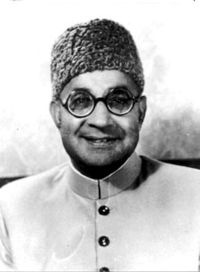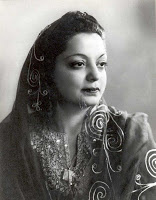Prime Ministers of Pakistan
Prime Ministers of Pakistan
This is a collection of newspaper articles selected for the excellence of their content. |
Liaquat Ali Khan
Liaquat Ali Khan served as Pakistan's prime minister from 1947 to 1951. He was assassinated on October 16, 1951 in Rawalpindi. To many Liaquat Ali Khan will always the best prime minister of Pakistan. He was the most honest and he was totally committed to his sacred cause. Being a Muslim and coming from a very rich family he did whatever one could possibly do with his wealth and efforts to have an independent separate country for Muslims. His name will always stand very tall as the most shrewd, accomplished and committed Prime Minister of the entire Sub-Continent. His wife, Gul-e-Rana Begum was a non-Muslim.
Many believe that it was the (in)famous budget of Liaquat Ali Khan, Muslim League leader and Finance Minister in the Interim Government of 1946, which led the Congres leadership to make up their mind for the Partition. Khan proposed 25% tax on business profits over one lakh, introduced capital gains and proposed a commission to unearth tax evasion. All these scared the top industrialists of the country, most of whom were Congres fund raisers like G D Birla, Jamnalal Bajaj. This budget, however, is hailed in Pakistani nationalist history as Khan’s great Poor Man’s Budget. It was also the daily difficulties in dealing with Liaquat Ali Khan’s strict expenditure control – Patel quipped that he could not even appoint a Peon due to Khan’s objections – that drove Congres leaders to exasperation.
Khan, who was born in an aristocratic family in Karnal, Haryana and fought election from Western UP, went on to become Pakistan’s first Prime Minister and was assassinated at the same ground, where Benazir Bhutto was killed in 2007. 1947 budget was largely drafted in his mansion in New Delhi’s Tilak Marg, which is today the official residence of the Pakistani High Commissioner, though it is not known to what extent it was influenced by his wife, Gul-e- Rana, who used to teach economics at IP College.
[His wife, his second wife to be precise, was a remarkable character herself. Born Shiela Irene Pant at Almora in a Kumaoni Brahmin family, recently converted to Christianity, she was a brilliant student of Lucknow University. While working as a lecturer at IP College, she met Khan when the latter came to deliver a lecture at the college. She converted to Islam while marrying Khan and went to Pakistan with her husband, where she immersed herself in nation building. Later on she served in many prestigious posts, including as Governor of Sindh. Today she is hailed as the Mother of Pakistan!]
Khawaja Nazimuddin
Khawaja Nazimuddin was Pakistan's prime minister from 1951 to 1953 till he was removed from the post by governor general Ghulam Muhammad. He was the first Bengali prime minister of Pakistan. He was appointed a Companion of the Order of the Indian Empire (CIE) in 1926, and was knighted in 1934 by the King-Emperor, George V, when he was appointed a Knight Commander of the Order of the Indian Empire (KCIE).[5] However, he renounced his knighthood in 1946 due to his belief in independence from Britain. Upon the formation of Pakistan, he became an important part of the early government. After the early death of Muhammad Ali Jinnah, Sir Khawaja succeeded him as the Governor-General of Pakistan. At this point in time, the position was largely ceremonial, and executive power rested with the Prime Minister. The first Prime Minister of Pakistan, Liaquat Ali Khan was assassinated in 1951, and Sir Khawaja stepped in to replace him. The dismissal of Sir Khawaja, the Prime Minister, by the Governor-General, Muhammad, signalled a troubling trend in Pakistani political history The Nazimabad and North Nazimabad suburbs of Karachi and Nazimuddin Roads of Dhaka and Islamabad have been named in honour of Sir Khawaja Nazimuddin. In his honor, the Pakistan Post issued a commemorative stamp in accordance to his respect. Sir Khawaja died in 1964, aged 70.He was buried at Suhrawardy Udyan in his hometown of Dhaka.
Huseyn Shaheed Suhrawardy
Huseyn Shaheed Suhrawardy served as Pakistan's prime minister from 1956 to 1957. He was forced to resign under threat of dismissal on October 10, 1957.
Zulfikar Ali Bhutto
Zulfikar Ali Bhutto was the founder of Pakistan People's Party (PPP). He served as the ninth prime minister of Pakistan from 1973 to 1977, and prior to that as the fourth President of Pakistan from 1971 to 1973. In 1977, Bhutto was deposed by his appointed army chief General Zia-ul-Haq in a bloodless coup. he was hanged to death by general zia ul haq
Benazir Bhutto
The eldest daughter of Zulfikar Ali Bhutto, Benazir Bhutto became the first woman prime minister of Pakistan in 1988. However, president Ghulam Ishaq Khan dismissed her government on corruption charges in 1990.
Nawaz Sharif
Nawaz Sharif replaced Benazir Bhutto as Pakistan's prime minister in 1990. Sharif had to step down in 1993 when president Ghulam Ishaq Khan dissolved the National Assembly.
Benazir Bhutto, second term
Benazir Bhutto replaced Nawaz Sharif in 1993 and was the prime minister of Pakistan till 1996. Same year, her government was dismissed by president Farooq Leghari.
Nawaz Sharif, second term
Nawaz Sharif took over the charge from Benazir Bhutto in 1997. He served as Pakistan's prime minister till 1999 when army chief General Pervez Musharraf removed him from the post in a coup
Shaukat Aziz
Shaukat Aziz served as Pakistan's prime minister from 2004 to 2007. He was the first PM to leave after completion of parliamentary term.
Yousaf Raza Gilani
Yousaf Raza Gilani was Pakistan's prime minister from 2008 to 2012. Gilani had to step down after the supreme court disqualified him.
Raja Pervez Ashraf
Raja Pervez Ashraf served as Pakistan's prime minister from 2012-2013. He led the first democratically elected government to the tenure's end.(22 June 2012 - 25 March 2013)
Mir Hazar Khan Khoso
25 March 2013 5 June 2013
Nawaz Sharif
5 June 2013-


